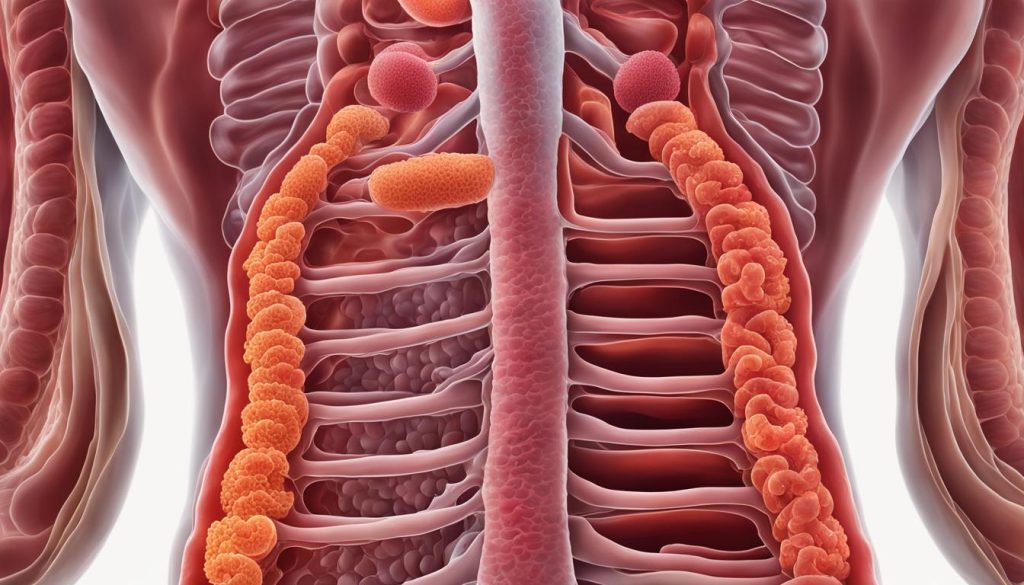Having intestinal parasites is more common than many people think. In this comprehensive guide, I will explore the ten most common symptoms of intestinal parasites and how to recognize them. We will also discuss the importance of proper testing and treatment options. Don’t ignore the signs – empower yourself with knowledge and protect your health effectively.
Key Takeaways:
- Intestinal parasites are more common than you may think.
- Recognizing the symptoms of parasites is crucial for timely diagnosis.
- Common signs of intestinal parasites include iron-deficiency anemia, unsatisfied after meals, muscle and joint pain, gastrointestinal issues, chronic fatigue, skin irritations, trouble sleeping, a history of food poisoning, unexplained itching, and bloating.
- Intestinal parasites can be a root cause or exacerbate autoimmune diseases like Hashimoto’s and Graves’.
- Testing for intestinal parasites is best done through a comprehensive stool test that uses PCR technology.
What is an Intestinal Parasite?

An intestinal parasite is a type of organism that lives inside the human body and feeds off its host. These parasites can include various types of parasitic worms such as tapeworms, roundworms, pinworms, whipworms, and hookworms. They thrive in the intestine and other parts of the digestive system, causing a wide range of symptoms and health complications.
Intestinal parasites survive by consuming the nutrients and resources inside the human body. They can attach themselves to the intestinal walls, lay eggs, and reproduce, further perpetuating the cycle of infection. The presence of these parasites can disrupt the normal functioning of the digestive system and lead to various symptoms.
10 Intestinal Parasite Symptoms
Intestinal parasites can cause a range of symptoms that can vary from person to person. It is important to be aware of these symptoms to recognize and address any potential parasitic infections. Here are the ten most common symptoms of intestinal parasites:
- Iron-deficiency anemia: Intestinal parasites can cause blood loss, leading to anemia and resulting in fatigue, weakness, and pale skin.
- Feeling unsatisfied after meals: Parasites can interfere with nutrient absorption, leaving you feeling hungry or unsatisfied even after eating.
- Muscle and joint pain: Some parasitic infections can cause muscle and joint pain, often accompanied by inflammation or stiffness.
- Grinding teeth in sleep (bruxism): Infected individuals may unknowingly grind their teeth while sleeping, which can be a sign of parasitic activity.
- Gastrointestinal issues: Common gastrointestinal symptoms include chronic constipation, diarrhea, bloating, and abdominal pain.
- Chronic fatigue or exhaustion: Intestinal parasites can drain your energy levels, leaving you feeling constantly tired or exhausted.
- Skin irritations or rashes: Certain parasites can cause skin irritations, rashes, or itching, especially in areas of the body where the parasites have entered.
- Trouble falling asleep or waking up multiple times during the night (insomnia): Parasitic infections may disrupt your sleep patterns, making it difficult to fall asleep or stay asleep throughout the night.
- History of food poisoning: If you have a recurring history of food poisoning, it could be a sign of chronic parasitic infection.
- Unexplained itching: Intense itching, particularly around the anus or genital area, can be a symptom of certain parasitic infections.
If you are experiencing any of these symptoms, it is important to consult with a healthcare provider for proper testing and diagnosis. Identifying and treating intestinal parasites can help alleviate these symptoms and improve your overall health.
How Do You Get Intestinal Parasites?
Contracting an intestinal parasite can happen in various ways, and it’s important to be aware of the potential sources. Here are some common ways you can come into contact with these organisms:
Consuming undercooked meat: Eating meat that is not fully cooked can expose you to parasites such as tapeworms or Trichinella.
Contaminated produce: Fruits and vegetables can be contaminated with parasites if they are not properly washed or if they come into contact with contaminated water or soil.
Swimming in lakes, ponds, or creeks: Bodies of water can harbor parasites like Giardia, which can enter your body through the mouth if you accidentally swallow the contaminated water.
Handling animals: Pets, livestock, or even wild animals can carry parasites that can be transmitted through direct contact. It’s crucial to practice good hand hygiene after handling animals to minimize the risk of infection.
By being mindful of these potential sources of infection, you can take steps to reduce your risk of contracting intestinal parasites and protect your health.
How to Test for Intestinal Parasites
When it comes to diagnosing intestinal parasites, a comprehensive stool test is the best approach. Unlike conventional stool tests that rely on live parasites being present in the sample, a comprehensive stool test utilizes Polymerase Chain Reaction (PCR) technology. This technology amplifies the DNA of the parasite, making it possible to detect even dormant or dead parasites, ensuring a more accurate diagnosis.
By working with a healthcare provider who offers comprehensive stool testing, individuals can gain a clearer understanding of their parasite status. This allows for more targeted treatment and proper management of intestinal parasites. It is important to note that comprehensive stool testing is a more reliable and comprehensive method compared to conventional methods.
- Benefits of Comprehensive Stool Testing:
- Accurate detection of dormant or dead parasites
- More reliable diagnosis
- Comprehensive assessment of parasite status
- Targeted treatment options
If you suspect that you may have an intestinal parasite or have been experiencing symptoms related to parasitic infections, discussing comprehensive stool testing with your healthcare provider is highly recommended. This approach ensures that you receive accurate results and appropriate treatment for your specific parasite situation.
How to Get Rid of Intestinal Parasites
If you have been diagnosed with an intestinal parasite, it’s important to take immediate action to eliminate the infection and restore your gut health. Here are some effective methods to help you get rid of intestinal parasites:
1. Parasite Cleanse
A parasite cleanse involves a holistic approach to eliminate parasites from your body. It generally includes a combination of detoxification support, herbal supplements, and dietary changes. The cleanse aims to create an environment in which parasites cannot thrive. It’s essential to follow the guidelines provided by a healthcare professional or a reputable source to ensure a safe and effective cleanse.
2. Prescription Medication
In some cases, prescription medications may be necessary to target specific parasite species. These medications are designed to kill or inhibit the growth of parasites, helping to eliminate the infection. It’s important to consult with a healthcare provider who can prescribe the appropriate medication based on your specific parasite infection.
3. Parasite Treatment Kit
Parasite treatment kits are commercially available and can provide a convenient and structured approach to eliminating intestinal parasites. These kits typically include a combination of herbal supplements or medications specifically formulated to target parasites. Follow the instructions provided with the kit and consult with a healthcare professional if you have any concerns or questions.
4. Probiotics
Probiotics are beneficial bacteria that can help restore and maintain a healthy balance in the digestive tract. While they don’t directly kill parasites, probiotics can support your immune system and improve overall gut health. Including probiotic-rich foods like yogurt, sauerkraut, and kefir in your diet or taking a high-quality probiotic supplement can help promote a healthy gut flora.
Remember, it’s crucial to work closely with a healthcare provider throughout the treatment process to ensure proper diagnosis, monitoring, and follow-up care. By combining targeted treatment methods with supportive measures, you can effectively eliminate intestinal parasites and restore your digestive health.
Intestinal Parasites as a Root Cause for Hashimoto’s and Graves’
Autoimmune diseases like Hashimoto’s and Graves’ have been the subject of extensive research, but there is still much to learn about their underlying causes. Recent studies have indicated a possible link between these conditions and parasitic infections, specifically toxoplasmosis and Blastocystis hominis.
Toxoplasmosis is caused by a parasite called Toxoplasma gondii, which can be transmitted through contaminated food, water, or soil. Research suggests that individuals with toxoplasmosis may be at a higher risk of developing autoimmune diseases, including Hashimoto’s and Graves’, due to the immune system’s response to the infection.
Blastocystis hominis, another intestinal parasite, has also been associated with autoimmune conditions. This parasite can cause chronic diarrhea, abdominal pain, and other gastrointestinal symptoms, which may trigger or exacerbate autoimmune responses in susceptible individuals.
The Connection Between Parasitic Infections and Autoimmunity
While the exact mechanisms are still being investigated, it is believed that parasitic infections can affect the immune system and disrupt its normal function. Research suggests that these infections may lead to an overactive immune response, causing the immune system to attack healthy cells and tissues, leading to autoimmune diseases like Hashimoto’s and Graves’.
It is important to note that the presence of intestinal parasites does not necessarily mean that an individual will develop an autoimmune disease. Genetic predisposition, environmental factors, and other triggers also play significant roles in the development of these conditions. However, addressing and treating parasitic infections may help alleviate symptoms and improve overall well-being in individuals with autoimmune thyroid issues.
Further Research and Treatment Implications
While the link between parasitic infections and autoimmune diseases is an area of growing interest, more research is needed to fully understand the connection and develop targeted treatment strategies. As scientists continue to study these relationships, healthcare providers are exploring various treatment approaches, including the use of antiparasitic medications and immune-modulating therapies, to address both the infections and the underlying autoimmune conditions.
By further unraveling the complexities of the immune system and its interactions with parasitic infections, researchers hope to develop more effective diagnostic tools and targeted treatment options for individuals affected by autoimmune diseases.

Special Cases: When Intestinal Parasites Are Helpful in Autoimmunity
In certain cases, intestinal parasites can play a beneficial role in managing autoimmune diseases like Crohn’s disease. One such treatment option is helminth therapy, which involves introducing parasitic worms into the gastrointestinal tract to reduce symptoms. While it may seem counterintuitive, these helminths, such as hookworms and whipworms, have been found to have immune-modulating effects that can provide relief for individuals suffering from autoimmune conditions.
Research suggests that helminths have anti-inflammatory properties and can help rebalance the immune system, leading to a reduction in symptoms. By introducing these parasites into the body, they interact with the immune system and dampen the excessive immune response that characterizes autoimmune diseases. This immune modulation can help alleviate symptoms, such as chronic inflammation and gastrointestinal distress.
Benefits of Helminth Therapy in Crohn’s Disease:
- Reduces inflammation in the gastrointestinal tract
- Improves symptoms of diarrhea and abdominal pain
- Enhances gut barrier function
- Modulates the immune response to reduce flare-ups
It’s important to note that helminth therapy should always be done under the guidance of a healthcare provider experienced in this type of treatment. The dosage and duration of treatment may vary depending on the individual’s condition and response. Additionally, it’s essential to weigh the potential benefits against any risks or side effects associated with helminth therapy.

Conclusion
After learning about the symptoms of parasitic infections, it is clear that early recognition and treatment are essential for optimal health. By understanding the common signs of intestinal parasites, individuals can take proactive steps to protect themselves. Seeking proper testing is crucial to ensure an accurate diagnosis, and healthcare providers who offer comprehensive stool tests using PCR technology can provide reliable results.
Once diagnosed with an intestinal parasite, there are various treatment options available. Prescription medications specifically target the parasite species and help eliminate the infection. Additionally, a parasite cleanse may be recommended, which involves detoxification support, herbal supplements, and dietary changes. Probiotics play a role in maintaining a healthy digestive tract and supporting the immune system, contributing to the restoration of gut health.
Addressing parasitic infections not only alleviates symptoms but also improves overall well-being. Whether through prescription medications or natural remedies, taking action against intestinal parasites can promote optimal health and relieve discomfort. Remember, timely detection and treatment are key to effectively managing parasite-related symptoms and ensuring a healthier future.
FAQ
What are the symptoms of intestinal parasites?
The most common symptoms of intestinal parasites include iron-deficiency anemia, feeling unsatisfied or full after meals, grinding teeth in sleep (bruxism), gastrointestinal issues like constipation and diarrhea, chronic fatigue or exhaustion, skin irritations or rashes, trouble falling asleep or waking up multiple times during the night (insomnia), a history of food poisoning, unexplained itching, and bloating.
How do you contract intestinal parasites?
Intestinal parasites can be contracted through various means, such as consuming undercooked meat, contaminated produce, or raw fish. Swimming in lakes, ponds, or creeks can also lead to parasitic infections. Additionally, handling animals without proper hand hygiene can transfer parasites onto surfaces and objects, making it easy to contract them.
Can intestinal parasites cause autoimmune diseases?
Yes, certain intestinal parasites, such as toxoplasmosis and Blastocystis hominis, have been linked to autoimmune diseases like Hashimoto’s and Graves’. Infections can trigger or exacerbate these conditions, and treatment for intestinal parasites may help resolve symptoms of autoimmune thyroid issues.
Are intestinal parasites ever beneficial?
In some cases, parasites can be helpful in managing autoimmune diseases like Crohn’s disease. Helminth therapy involves the introduction of parasitic worms into the gastrointestinal tract to reduce symptoms. Helminths, such as hookworms and whipworms, have anti-inflammatory and immune-modulating effects that can provide relief. However, this treatment should always be done under the guidance of a healthcare provider.
How can you test for intestinal parasites?
The best way to test for intestinal parasites is through a comprehensive stool test, which uses Polymerase Chain Reaction (PCR) technology to amplify the DNA of a parasite. This test is more accurate than conventional stool tests, which require live parasites to be present in the stool sample. PCR technology can detect dormant or dead parasites, providing a more reliable diagnosis.
What are the treatment options for intestinal parasites?
Once diagnosed with an intestinal parasite, treatment options include prescription medications that target the specific parasite species. Additionally, a parasite cleanse may be recommended, which typically involves detoxification support, herbal supplements, and dietary changes. Probiotics can also play a role in maintaining a healthy digestive tract and supporting the body’s immune system.
What happens if intestinal parasites are left untreated?
If left untreated, intestinal parasites can cause a range of health issues, including nutrient deficiencies, organ damage, compromised immune function, and chronic fatigue. It is important to address parasitic infections promptly to prevent further complications.

